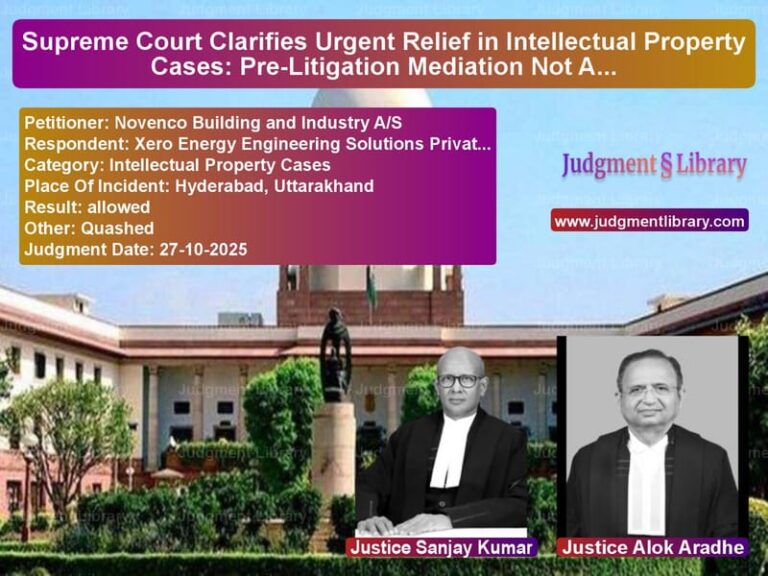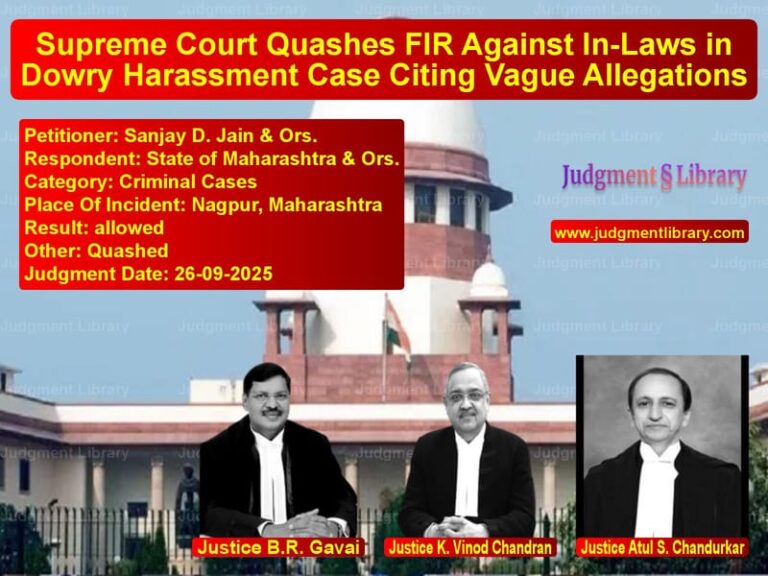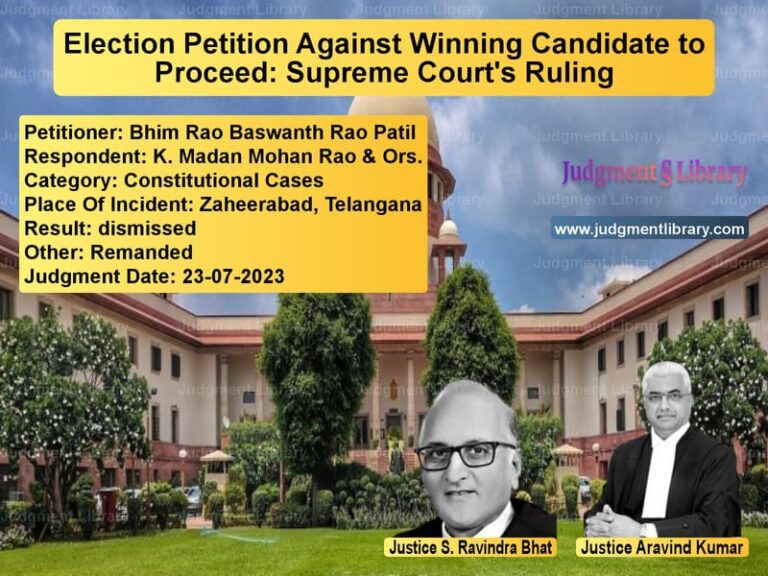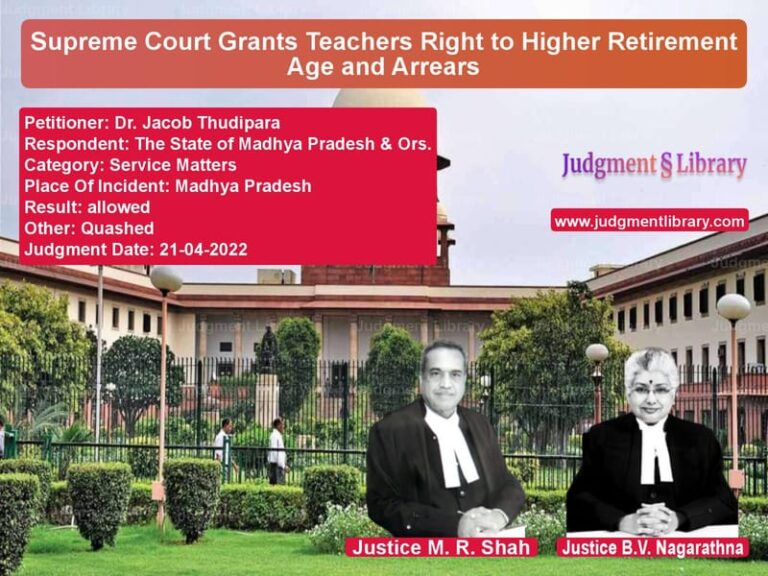Supreme Court Upholds Abolition of Odisha Administrative Tribunal: Key Legal Analysis
The Supreme Court of India recently ruled on the abolition of the Odisha Administrative Tribunal (OAT) in the case of Orissa Administrative Tribunal Bar Association v. Union of India & Others. This ruling is a landmark judgment concerning the powers of the Union Government to abolish state administrative tribunals (SATs) and the extent of judicial intervention in policy decisions. The Court upheld the Union Government’s decision to abolish the OAT, citing its administrative inefficiency and the redundancy of its existence after the judgment in L. Chandra Kumar v. Union of India (1997).
Background of the Case
The case originated from a challenge to the Union Government’s notification dated 2 August 2019, which abolished the OAT. The OAT was established under the Administrative Tribunals Act, 1985 on the request of the Odisha State Government. It was created to provide speedy resolution of service-related disputes concerning state government employees.
However, the State of Odisha later recommended abolishing the tribunal, citing delays in case disposal, financial constraints, and increased litigation due to the High Court’s jurisdictional reinstatement in service matters following the L. Chandra Kumar case. The Orissa High Court dismissed petitions challenging the abolition of the OAT, prompting the present appeal before the Supreme Court.
Arguments of the Parties
Petitioner’s Arguments (Orissa Administrative Tribunal Bar Association)
- The abolition of the OAT violated Article 323-A of the Constitution, which mandates the establishment of tribunals for service disputes.
- The Union Government did not have the power to rescind its previous notification establishing the OAT, as there was no provision for abolition in the Administrative Tribunals Act, 1985.
- The decision to abolish the OAT was arbitrary and violated Article 14 of the Constitution.
- The government’s reliance on Section 21 of the General Clauses Act to rescind the OAT’s establishment notification was legally impermissible.
- The abolition of the OAT without consultation with stakeholders, including the tribunal’s employees and litigants, violated natural justice principles.
Respondent’s Arguments (Union of India and State of Odisha)
- The Administrative Tribunals Act, 1985 provides for the establishment of SATs at the request of state governments, but does not mandate their permanent existence.
- The OAT had become redundant after the L. Chandra Kumar judgment, which restored the High Courts’ jurisdiction over service matters.
- The tribunal’s low case disposal rate, financial burden, and inefficiency justified its abolition.
- The Union Government had the power to rescind its notification establishing the OAT under Section 21 of the General Clauses Act.
- The Orissa High Court was capable of handling the service disputes that would be transferred from the OAT.
Key Observations of the Supreme Court
The Supreme Court upheld the Union Government’s decision, making several key observations:
- Tribunals Are Not Mandatory: The Court held that Article 323-A is an enabling provision and does not mandate the establishment of SATs in every state.
- Administrative Discretion in Policy Matters: The government has the power to evaluate and modify administrative structures based on efficiency and policy considerations.
- Application of General Clauses Act: The Court ruled that the Union Government was legally permitted to rescind the OAT’s establishment notification under Section 21 of the General Clauses Act.
- Not a Violation of Article 14: The decision to abolish the OAT was based on reasonable grounds, including financial constraints and inefficiency, and was therefore not arbitrary.
- Access to Justice Remains Intact: The Court observed that the Orissa High Court’s jurisdiction over service matters would ensure that litigants were not left without a forum for dispute resolution.
Final Ruling
The Supreme Court dismissed the appeals and upheld the abolition of the OAT, stating:
- The Union Government acted within its powers in rescinding the notification that established the OAT.
- The abolition of the OAT did not violate fundamental rights or principles of natural justice.
- The Orissa High Court was capable of handling service matters, and the abolition of the OAT did not leave litigants without a remedy.
- The notification dated 2 August 2019 was valid, despite not being issued in the name of the President of India.
Implications of the Judgment
This ruling has several significant implications:
- Affirms Government’s Power Over Tribunals: The judgment clarifies that the Union Government can abolish tribunals based on policy considerations.
- Strengthens High Court Jurisdiction: The abolition of the OAT reinforces the role of High Courts in handling service matters.
- Restricts Judicial Overreach in Policy Decisions: The Court emphasized that policy decisions regarding tribunals are within the government’s domain.
- Ensures Efficient Resource Utilization: The ruling underscores the importance of assessing the effectiveness and financial viability of tribunals.
Conclusion
The Supreme Court’s decision in Orissa Administrative Tribunal Bar Association v. Union of India marks a critical moment in the legal landscape concerning administrative tribunals. By upholding the abolition of the OAT, the Court reaffirmed the government’s discretion in managing tribunals while ensuring that access to justice remains protected. The ruling sets a precedent for the restructuring of tribunals based on efficiency and policy needs, reinforcing that tribunals must function effectively to justify their existence.
Petitioner Name: Orissa Administrative Tribunal Bar Association.Respondent Name: Union of India & Others.Judgment By: Justice Dhananjaya Y Chandrachud, Justice Hima Kohli.Place Of Incident: Odisha.Judgment Date: 20-03-2023.
Don’t miss out on the full details! Download the complete judgment in PDF format below and gain valuable insights instantly!
Download Judgment: orissa-administrativ-vs-union-of-india-&-oth-supreme-court-of-india-judgment-dated-20-03-2023.pdf
Directly Download Judgment: Directly download this Judgment
See all petitions in Public Sector Employees
See all petitions in Employment Disputes
See all petitions in Disciplinary Proceedings
See all petitions in Pension and Gratuity
See all petitions in Judgment by Dhananjaya Y Chandrachud
See all petitions in Judgment by Hima Kohli
See all petitions in dismissed
See all petitions in supreme court of India judgments March 2023
See all petitions in 2023 judgments
See all posts in Service Matters Category
See all allowed petitions in Service Matters Category
See all Dismissed petitions in Service Matters Category
See all partially allowed petitions in Service Matters Category







